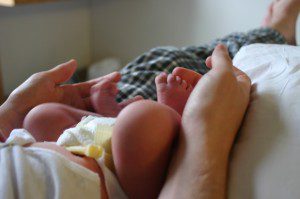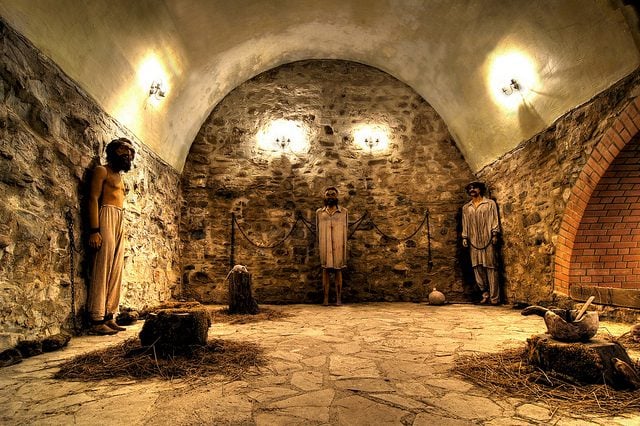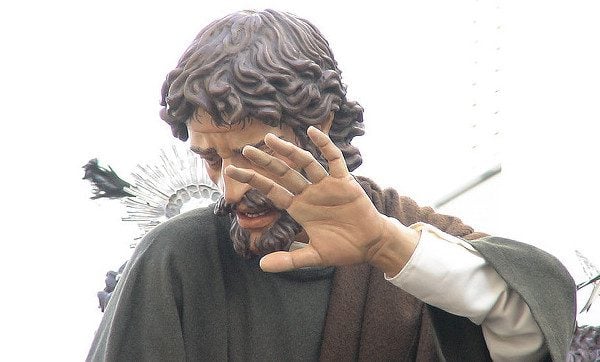Thanksgiving Day Homily — Matthew 6: 25-33
(Due to confusion at my parish, in the Prayer Book, and in the BCP iPhone app,
I ended up preaching the Thanksgiving lectionary for Year B rather than Year C).
I’ll never forget the first day my wife went back to work after we had our first son. I was a nervous wreck.
In addition to the worries every new father has, I’m the youngest in my family, and I never babysat or worked in my church’s nursery, so I had no experience being around infants. In fact, I had never changed a diaper before my son came along, that is, if you don’t count all the times I practiced on his teddy bears before he was born. But there I was, a brand-new stay-at-home dad, on his first day of solo parenting.
Things were going along just fine for a bit. That is until I had to change his diaper. The diaper change itself went just fine, but in my hurry to pick him up before he began crying, I accidentally bumped his head on the changing table.
Then, he erupted. Wailed like a banshee. And nothing seemed to soothe him. Which only made matters worse. So, with a baby screaming in my ear, I scurried to the computer and did what no parent should ever do. I googled the symptoms of concussions in infants. And wouldn’t you know it, he had them all. By this time, I was completely freaking out. So I called my wife, with my heart pounding and voice shaking, I explained that I had broken the baby and that I thought our son had a concussion.
At this point, my wife had been at work for all of two hours.
Still despite her reassurances that he’d be fine, I still took out the flashlight to check to see if his pupils would respond to light. Finally, unable to shake my anxiety and worry, I called the pediatrician.
Let’s just say, over the next three months, I got to know my pediatrician pretty well. She was a very patient woman.
My son was fine, of course, but this is not the first, nor was it the last time, my anxiety got the better of me, particularly as a parent.
So when I read Jesus here commanding everyone do not worry, about anything, I can’t help but feel a little guilty and a little skeptical.
What did Jesus know about worry and anxiety? He never had kids. He never had the feeling of getting halfway home from Jerusalem and realizing you’d left your child at the Temple by accident. Sometimes I wonder if Jesus had had kids, if he might have reconsidered some of his teachings. Look at the birds! They are fed and do not worry. Look at the fields! They are clothed with beautiful grass and lily flowers. Don’t worry! You can almost hear the voice of every carefree California surfer dude in this passage.
There’s lots of other things Jesus never had to deal with. He never had to pay bills. He never had to get into a good college and get a good job. He never had to study for final exams. He never had to navigate the anxiety-ridden world of health insurance. He never had to deal with a terminally ill loved one — whether a child, a spouse, or a parent. And you know what else? Jesus never had to cook a 15-pound frozen Butterball turkey without it drying out for a massive Thanksgiving feast with his extended family. I mean, he was kind of a vagabond for most of his ministry, bouncing from town to town, crashing in people’s homes while teaching and healing.
But there it is any way. Probably the most difficult teaching in all of Scripture for me. “Do not worry.”
I’d rather love my worst enemy than have to wrestle with this one.
That anxiety part of me is difficult to turn off completely. In fact, in an ironic twist, I’ve been rather anxious and stressed out about this very sermon about not being anxious and stressed. Which, of course, makes me feel even more stressed and anxious.
Anxiety is kind of like that game where the only rule is to not think about dancing pink elephants. Suddenly, the only thing you can think about is dancing pink elephants. It feeds of itself until it reaches a fever pitch. The more we worry about things, the more things it seems we have to worry about. And if we’re not careful, we begin to believe in our worries rather than in ourselves, our friends and family, and sometimes even God’s love for us.
Anxiety is hard to avoid in our post-9/11 world of pressure cooker bombs and lone gunmen so much so that we can begin to see the world as a lonely and malevolent place rather than as a source of beauty, life, and divine creativity. We begin to see others as our competitors for resources, for jobs, and for status rather than as collaborators and neighbors who would come to our aid in our troubles and journey with us through suffering.
See, anxiety operates on a premise of scarcity, of not enough. It isolates us and pulls us into a world in which we believe we are all alone with our struggles.
We worry won’t have enough food to eat. Not enough clothes to wear. Not enough money to pay the bills. Not enough money to retire on.
Sometimes it even turns more sinister and our anxiety revolves around the idea that we ourselves are not enough, that there is a scarcity somewhere inside us – in our resolve, our strength, our abilities, our faith – and we won’t be able to make it through life’s challenges.
Thinking back on my experience as a new father, my anxiety wasn’t about my son having a concussion. Deep down, I knew he was okay. My anxiety was about whether I would be a good enough father to him.
Our anxieties about superficial things often mask deeper, more existential fears about ourselves or about God.
We fear we will fail. We fear God will fail us, or worse, we fear God will abandon us if don’t work hard enough or if we aren’t holy enough.
So when Jesus commands us not to worry and not to be anxious, he is essentially repeating what is said every time God interrupts our world.
“Do not be afraid.”
It is one of the most repeated divine command in all of Scripture. God or God’s messengers tell us this more than 100 times in the Bible.
Do not be afraid, for God is with us.
It is, of course, easier said than done. But I think it’s because maybe we’ve misunderstood the antidote to fear and worry and anxiety.
The antidote to fear isn’t courage. The antidote to worry isn’t faith. The antidote to anxiety isn’t a devil-may-care attitude.
Rather, the antidote, I believe, is gratitude.
It’s thanksgiving.
Something profound and transformative happens when we give thanks and live our lives in gratitude to God and to one another. And if we make a lifelong practice of it, it fundamentally shifts the way we view the world.
Worry and anxiety are rooted in fear, scarcity and isolation. Gratitude is rooted in love, abundance and connection.
In the act of giving thanks, I have shown you my cards. I have shown you what I value and where I am vulnerable.
When I say thank you, I say I am not enough on my own and that I need you.
When I say thank you, I say without shame that I could not have made it by myself, that I reject the myth of the self-made man who must pull himself up by his bootstraps unaided.
This is grace. It recognizes, admits, and embraces our incompleteness, our utter, beautiful and holy dependence on each other.
There is a phrase rooted in African spirituality and made popular by Archbishop Desmond Tutu. It’s a philosophy called Ubuntu, and translates roughly to this: I exist because we exist. I am because the community is.
This communal thanksgiving is central to who we are as Christians. So central we named our primary, weekly ritual after it. In the Greek, Eucharist literally means “Thanksgiving.”
So, for us, each week is Thanksgiving and Thanksgiving is a sacrament. It is an outward sign of an inward grace. Each week there is a table set and feast of love and thanksgiving which we share with each other. We give thanks for God’s abundance and this community’s abundance. We come together in recognition that at this table, we are made whole in our unity with God and with each other.
It is the ultimate reminder that we are not alone in this world or in our struggles. It is the ultimate reminder not to worry or to fear not. For God is with us and with us through this community.
This isn’t just spiritual conjecture about the importance of gratitude, either. Science has finally caught up with religion on this one. Studies show that spending time counting our blessings, keeping a gratitude journal, or writing letters of thanksgiving to our family, friends and mentors is one of the most reliable ways to lift our mood and transform our outlook on life. Thanksgiving decreases depression and anxiety. Thanksgiving helps us sleep better, improves blood pressure, helps people with PTSD, and can even make students not hate school so much. In fact, keeping a daily gratitude journal has been shown in many cases to be as effective as clinical therapy.
Even Jesus gave thanks. When Jesus took the bread and fish he gave thanks at the feeding of the multitudes. At the Last Supper, Jesus took the bread and the cup of wine and gave thanks. When he prays in John, he gives thanks for his friends and disciples.
Giving thanks is a fundamental part of who we are. It shouldn’t just be one day of the year where we sit around the table and tell each other what we are thankful for. God calls us to an ongoing practice of gratitude and thanksgiving. And it will take practice, especially, if, like me, you’ve been practicing anxiety for the better part of adulthood.
Practicing gratitude invites us to see the world as a place full of God’s abundance. It reminds us that the earth’s abundance doesn’t belong to us so it isn’t ours to hoard or to store up where moths and mold destroy. Rather a practice of gratitude sees the world’s abundance as a gift of God to be shared by all God’s children. When we see the world as a place of abundance for which we can give thanks rather than a place of scarcity that evokes anxiety, we can begin to respond to the needs of the world and the needs of each other not out of guilt, or obligation, or indebtedness but out of our own thankfulness rooted in an overflowing sense of God’s unfailing love.
So let us give thanks for one another. Let us give thanks to the Lord our God.
Because it is right and a good and a joyful thing, always and everywhere to give thanks.
_____
References:
Lose, David. “Picture This,” Working Preacher.












